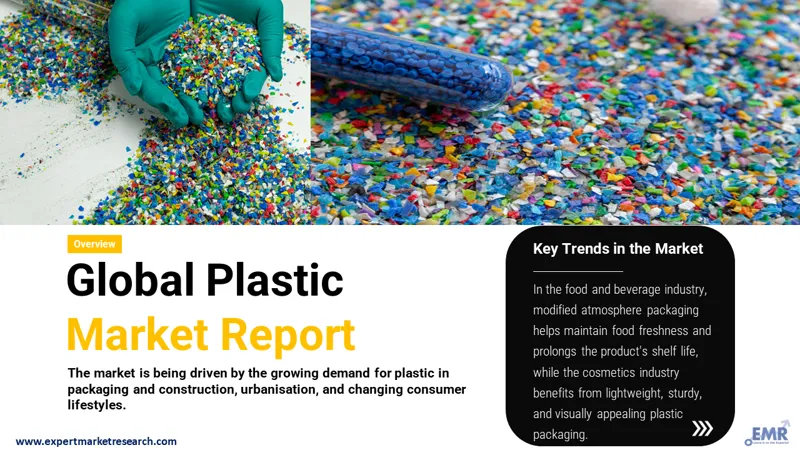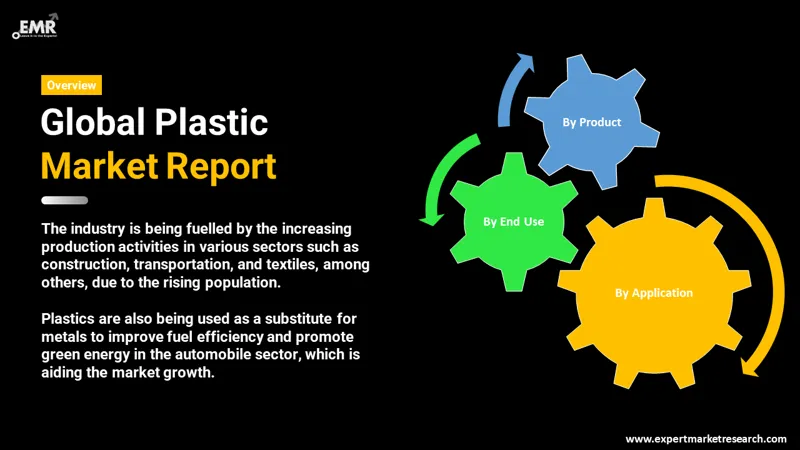
Consumer Insights
Uncover trends and behaviors shaping consumer choices today
Procurement Insights
Optimize your sourcing strategy with key market data
Industry Stats
Stay ahead with the latest trends and market analysis.
Trending Now



The global plastic market size attained a value of approximately USD 559.38 Billion in 2024. The market is further expected to grow in the forecast period of 2025-2034 at a CAGR of 4.20%, reaching a value of around USD 844.08 Billion by 2034. Materials such as glass, metals, wood, natural rubber, and other substitutes would be increasingly replaced by plastics as forecasted by the market report to reshape the dynamics of the global plastics market. However, the global resins market is tightly regulated. Several companies in the global plastic resins market offer a number of resin varieties such as polystyrene (PS), polyethylene (PE), acrylonitrile butadiene styrene (ABS), polypropylene (PP), polybutylene terephthalate (PBT), polyphenylene oxide (PPO), polyurethane (PU), polyether ether ketone (PEEK), polyvinyl chloride (PVC), polyethylene terephthalate (PET), polycarbonate (PC), polysulfone (PSU), polyamide (PA), and polyphenylsulfone (PPSU).
Base Year
Historical Year
Forecast Year






Value in USD Billion
2025-2034
Plastic Market Outlook
*this image is indicative*
Read more about this report - REQUEST FREE SAMPLE COPY IN PDF
The vast versatility, affordability and availability that plastic resins offer is critical to automotive, construction, packaging, electronics, and medical application industries. One of the main factors propelling the growth of the plastic market is the packaging industry. The usage of polypropylene resins for packing materials has increased due to their lightweight, robust, and adaptable qualities. Polypropylene resins guarantee the safe, secure, and efficient delivery of goods has also been increased by e-commerce trends. Other central appeals that are driving further market expansion include a growing demand for single-use plastics such as food packaging, beverages, and personal care products among increasing environmental concerns.
Of all these industries, an extremely dominant force ensuring the overall growth of plastic market demands is the automotive sector in the North American market. Manufacturers are now using more plastics in their operations with the ongoing trend of reducing vehicle weight for improved fuel economy. Plastics are lightweight, shock-resistant, and impermeable, and they are used in engine parts, exteriors, and interiors of automobiles. Moreover, the construction industry is also propelling increased revenues as plastics are frequently used for electrical wiring, flooring, roofing, insulation, and pipes. Given their relative economy, installation, and corrosion resistance, plastic compounding is widely acceptable for modern construction work.
The growing need for polyethylene terephthalate (PET) in packaging applications is another recent development in the plastics industry. PET is a highly sought-after material for packaging solutions in the food and beverage, personal care, and pharmaceutical sectors due to its lightweight, durable, and recyclable qualities. The growing usage of PET enables businesses to lower carbon footprints and raise recycling rates as the drive for sustainability grows, a shift that is propelling the global plastics market expansion. Concerns about environmental responsibility, which aligns well with the rising demand for PET, proportionally increases its market share.
The increasing need for lightweight plastics in a variety of industries, including consumer products, construction, and the automotive sector, is a significant emerging trend impacting the global plastics market. Due to their affordability, longevity, and potential to reduce carbon emissions, materials including PVC, PET, polystyrene, and olefins are becoming increasingly common. In the construction industry, lightweight plastics offer inexpensive and significantly more robust substitutes for traditional materials, while in the automotive industry, they improve carbon emissions by reducing vehicle weight. Similarly, they give consumer goods flexible packaging options. As businesses look for sustainability and performance, the use of these lightweight plastics or polymers is growing, propelling market expansion.
Furthermore, the fluctuating crude oil prices, which directly affects the cost of petrochemicals—the bulk raw materials used to make plastics—is one of the most significant factors considered in the industry. The plastic market price tends to rise in line with increases in crude oil prices due to the higher production costs. This makes the entire market economics unstable and affects supply and demand.

Read more about this report - REQUEST FREE SAMPLE COPY IN PDF
Though confronted with intense competition, the global plastics sector is marked by a fair degree of fragmentation owing to the presence of a large number of global players including BASF SE, SABIC, Dow Inc., DuPont de Nemours, Inc., Evonik Industries AG, Sumitomo Chemical Co. Ltd., Arkema, Celanese Corporation, and Eastman Chemical Company. These are key players in the plastics industry with representatives based in different parts of the globe, competing with medium-sized and smaller regional players. Regional players with good distribution networks and knowledge of suppliers as well as regulations create challenges to both the global giants and also competition within each other.
In order to further facilitate product formulation to meet the standards set by emerging regulations, global players are increasingly investing in research and development efforts. Their advances in materials science have led to the creation of specialty plastic compounds. In addition, technology has continued to witness a greater emphasis by industry leaders for plastic production, thereby meeting the growing demands of tailored solution for specific industries, thereby marking their dominant footprints.
To meet the rising demand for various types of plastic material, global plastic companies are increasingly concentrating on boosting their production expansion. The manufacturing of polycarbonates, which are used in the automotive, electronics, and construction industries due to their durability and transparency, is one important area of development. The majority of companies are investing in developing more compounding units, which enable them to increase the amount and quality of polycarbonates they can make.
Owing to its strong market revenue share, polyethylene (PE) continues to dominate the plastics industry in the plastic film sector. Product segmentation analysis as per the market report indicates that PE is utilized in various aspects of packaging in plastic films in retail, culinary, and the agricultural industry. In the agricultural industry, it is used for crop protection and greenhouse films to increase output and quality. Polyethylene's cost-effectiveness and adaptability are driving its rising demand across a range of applications including plastic films.
The extensive use of polypropylene (PP) in the automotive sector is resulting in its increased market revenue share. PP's lightweight and fuel-saving characteristics make it one of the most preferred general-purpose plastic polymers for automotive applications. Regulatory trends that favor using green materials and strict vehicle fuel efficiency standards also support improved material demand and facilitate increased automotive production. The combination of these components ensures that polypropylene is a necessary component in the manufacturing of automobiles.
In the global plastics industry, polyurethane (PU) is currently trending, particularly in the building insulation sector, which accounts for a sizeable market revenue share. Owing to its exceptional thermal performance, which promotes energy efficiency, PU is frequently used in building insulations. In refrigeration, PU influences the growth of more sustainable and energy-efficient insulating materials to meet escalating environmental concerns, supporting the market's expansion.

Read more about this report - REQUEST FREE SAMPLE COPY IN PDF
Injection molding accounts for a large market revenue share in the plastic industry. Applications of this versatile manufacturing process comprise the production of plastic materials that are used in medical devices and containers and automotive parts. Since it provides high accuracy and reasonably low cost over the full range of applications in which it is currently used, injection molding is widely accepted by many sectors, from pharmaceuticals to automobiles.
Thermoforming is one of the growth drivers of the global plastics market, especially driven by the packaging industry. Thermoforming is continuing to grow in terms of market revenue share. It is a process of shaping thermoplastic sheets with methods such as pressure forming and vacuum forming, making it suitable for creating custom packaging. Thermoforming has the advantage of being able to produce strong yet lightweight plastic containers applicable across so many areas. With the growing demand for low-cost and efficient packaging, it continues to find a wide application in the market.
According to the market analysis, blow molding is gaining market revenue share because it can produce a wide variety of hollow plastic parts, such as bottles, tubes, cans, and containers. Blow molding is being applied for developing these products so that greater efficiency can be ensured. The process is efficient and functional in the production of the much sought-after polyethylene and polypropylene plastics. Blow molding has advantages over injection molding in making uniform hollow lightweight components. Thus, it has become one of the crucial steps in making a variety of plastic containers.
Plastic packaging holds a significant market revenue share as per the end-use segmentation. This is because of their superior performance, longer lifespans, and reduced prices. Such characteristics make these polymers appropriate for product protection across a range of sectors, including consumer goods, food & beverage, and pharmaceuticals. Plastic packaging materials continue to lead the market due to the rising demand for low cost, long durability, and environmentally friendly packaging options. It offers high-performance, multipurpose, and long-lasting solutions for a range of applications.
Plastic packaging is a primary market driver, because it is versatile and inexpensive. Plastics serve as low-cost packaging materials while offering high performance, long durability, and also protects products of all types. The growing popularity of online shopping has boosted demand for sturdy, lightweight plastic packaging that is strong enough for shipping purposes. Also, plastics are preferred due to their high printability, which has made the trend of personalized branding possible. With the need for consumers to be served efficient, value-for-money packaging solutions, the capability of plastic packaging to be both practical and high-performance remains to spur development across various sectors from e-commerce, food and beverages to pharma and retail, solidifying its position in the global market for plastics even more.
With a considerable market revenue share, building and construction are two important end-use applications driving the global plastics market. Plastics are widely used in the construction industry for insulation, flooring, roofing, and piping because of their strength, affordability, and adaptability. The building industry prefers to employ plastics because they are lightweight, weatherproof, and simple to install. These features make them ideal for modern infrastructure. Across all end-use sectors in construction, plastics continue to be essential as consumer interest in environmentally friendly and energy-efficient building materials grows.
Due to its rapid urbanization, improving economic conditions, and expanding infrastructure, the Asia Pacific region holds a significant share in the plastics market revenue. The growing need for plastics and plastic compounds is mostly driven by the region's diverse industries, which include automotive, industrial machinery, construction, packaging, and electrical and electronics. Plastics are essential components in automotive production because they are utilized to create lightweight parts that improve fuel efficiency and in industrial machinery because they offer durable and affordable substitutes. Plastics are also commonly used in the construction industry for applications including flooring, insulation, and pipes because of their durability and adaptability. Additionally, the growing need for creative and environmentally friendly plastic solutions has led to growth in the packaging sector in Asia Pacific.
Due to their insulating properties, plastics are also used in the electrical and electronics industries for wiring, connections, and housings. Given the rise in plastic production in the area, the Asia Pacific plastics market is anticipated to grow rapidly due to rising consumer demand and increasing infrastructural expansion.
The growing demand in various application segments is driving the rapid growth of the North American plastics market. Epoxy polymers are a major market driver due to their superior performance, durability, and biocompatibility; they are widely employed in medical devices. In addition to the medical industry, plastics are essential to consumer goods, utilities, packaging, construction, electrical and electronics, automotive, and agriculture. Owing to their adaptability, plastics may be used in a variety of ways to meet the specific needs of different industries. These offer lightweight and affordable solutions in packaging, while also reducing vehicle weight and improving fuel efficiency in the automobile industry.
Companies in the plastics market are increasingly prioritizing sustainability, material innovation, minimizing environmental footprint, and increasing product performance. Plastic companies are focusing on recent industry trends that include creating recyclable and biodegradable plastics, enhancing production efficiency, and fulfilling industry-specific requirements to increase their market shares.
The global plastics market report provides detailed information on market conditions and industry trends. Regional, end-use, product, and application divisions of the market allow for a thorough examination of each sub-segment. A precise grasp of the key factors, possibilities, and challenges in diverse settings and applications, including electronics, packaging, automotive, and construction, is made possible by this segmentation. The study offers practical forecasts and strategic recommendations based on this parameter analysis.
Product Outlook (Revenue, Billion, 2025-2034)
Application Outlook (Revenue, Billion, 2025-2034)
End-Use Outlook (Revenue, Billion, 2025-2034)
Region Outlook (Revenue, Billion, 2025-2034)
*While we strive to always give you current and accurate information, the numbers depicted on the website are indicative and may differ from the actual numbers in the main report. At Expert Market Research, we aim to bring you the latest insights and trends in the market. Using our analyses and forecasts, stakeholders can understand the market dynamics, navigate challenges, and capitalize on opportunities to make data-driven strategic decisions.*
Get in touch with us for a customized solution tailored to your unique requirements and save upto 35%!
The plastic market as per the industry report is valued at USD 559.38 Billion.
The market is projected to grow at a CAGR of 4.20% between 2025 and 2034.
The plastic market value is estimated to reach USD 844.08 Billion by 2034.
The key driver of the plastic market growth is increasing substitution of plastics for materials like glass, metals, wood, natural rubber, and others.
The key trend influencing demand in the market is the growing importance of the vast versatility, affordability and availability that plastic resins offer in automotive, construction, packaging, electronics, and medical application industries.
The major regions in the market are North America, Latin America, the Middle East and Africa, Europe, and the Asia Pacific.
The various products considered in the market report are polyethylene (PE), polypropylene (PP), and polyurethane (PU), polyvinyl chloride (PVC), polyethylene terephthalate (PET), polystyrene (PS), acrylonitrile butadiene styrene (ABS), polybutylene terephthalate (PBT), polycarbonate (PC), and others.
The significant applications of plastic are injection moulding, blow moulding, roto moulding, compression moulding, casting, thermoforming, extrusion, and calendering, among others.
The various end-use segments considered in the market report are plastic packaging and building and construction, electrical and electronics, automotive, medical devices, agriculture, furniture and bedding, consumer goods, utility, and others.
The major players in the market are BASF SE, Evonik Industries AG, Sumitomo Chemical Co., Ltd., Lyondellbasell Industries Holdings B.V., Eastman Chemical Company, Saudi Basic Industries Corporation, The Dow Chemical Company, Celanese Corporation, LOTTE Chemical Corporation, Exxon Mobil Corporation, DuPont de Nemours, Inc., Toray Industries, Inc, INEOS Limited, Ducor Petrochemicals B.V, Repsol S.A., SABIC, Arkema, Chevron Phillips Chemical Co., LLC, Formosa Plastics Corporation, Covestro AG, Mitsui & Co., Plastics Ltd., TEIJIN LIMITED, Eni S.p.A., LG Chem, LANXESS, CHIMEI, Huntsman International LLC, and RTP Company, among others.
The various applications that dominated the plastic market are injection molding, thermoforming, and blow molding.
The Asia Pacific market held the largest plastic market revenue share.
Explore our key highlights of the report and gain a concise overview of key findings, trends, and actionable insights that will empower your strategic decisions.
| REPORT FEATURES | DETAILS |
| Base Year | 2024 |
| Historical Period | 2018-2024 |
| Forecast Period | 2025-2034 |
| Scope of the Report |
Historical and Forecast Trends, Industry Drivers and Constraints, Historical and Forecast Market Analysis by Segment:
|
| Breakup by Product |
|
| Breakup by Application |
|
| Breakup by End Use |
|
| Breakup by Region |
|
| Market Dynamics |
|
| Competitive Landscape |
|
| Companies Covered |
|
| Report Price and Purchase Option | Explore our purchase options that are best suited to your resources and industry needs. |
| Delivery Format | Delivered as an attached PDF and Excel through email, with an option of receiving an editable PPT, according to the purchase option. |
Datasheet
One User
USD 2,499
USD 2,249
tax inclusive*
Single User License
One User
USD 3,999
USD 3,599
tax inclusive*
Five User License
Five User
USD 4,999
USD 4,249
tax inclusive*
Corporate License
Unlimited Users
USD 5,999
USD 5,099
tax inclusive*
*Please note that the prices mentioned below are starting prices for each bundle type. Kindly contact our team for further details.*
Flash Bundle
Small Business Bundle
Growth Bundle
Enterprise Bundle
*Please note that the prices mentioned below are starting prices for each bundle type. Kindly contact our team for further details.*
Flash Bundle
Number of Reports: 3
20%
tax inclusive*
Small Business Bundle
Number of Reports: 5
25%
tax inclusive*
Growth Bundle
Number of Reports: 8
30%
tax inclusive*
Enterprise Bundle
Number of Reports: 10
35%
tax inclusive*
How To Order
Our step-by-step guide will help you select, purchase, and access your reports swiftly, ensuring you get the information that drives your decisions, right when you need it.

Select License Type
Choose the right license for your needs and access rights.

Click on ‘Buy Now’
Add the report to your cart with one click and proceed to register.

Select Mode of Payment
Choose a payment option for a secure checkout. You will be redirected accordingly.
Track prices with detailed trend reports.

Analyse trade data for supply chain insights.

Leverage cost reports for smart savings

Enhance supply chain with partnerships.

Gain insights to stay ahead and seize opportunities.

Get insights & trends for a competitive edge.

Track prices with detailed trend reports.

Analyse trade data for supply chain insights.

Leverage cost reports for smart savings

Enhance supply chain with partnerships.

Gain insights to stay ahead and seize opportunities.

Get insights & trends for a competitive edge.

Track prices with detailed trend reports.

Analyse trade data for supply chain insights.

Connect For More Information
Our expert team of analysts will offer full support and resolve any queries regarding the report, before and after the purchase.
Our expert team of analysts will offer full support and resolve any queries regarding the report, before and after the purchase.
We employ meticulous research methods, blending advanced analytics and expert insights to deliver accurate, actionable industry intelligence, staying ahead of competitors.
Our skilled analysts offer unparalleled competitive advantage with detailed insights on current and emerging markets, ensuring your strategic edge.
We offer an in-depth yet simplified presentation of industry insights and analysis to meet your specific requirements effectively.



Australia
63 Fiona Drive, Tamworth, NSW
+61-448-061-727
India
C130 Sector 2 Noida, Uttar Pradesh 201301
+91-723-689-1189
Philippines
40th Floor, PBCom Tower, 6795 Ayala Avenue Cor V.A Rufino St. Makati City,1226.
+63-287-899-028, +63-967-048-3306
United Kingdom
6 Gardner Place, Becketts Close, Feltham TW14 0BX, Greater London
+44-753-713-2163
United States
30 North Gould Street, Sheridan, WY 82801
+1-415-325-5166
Vietnam
193/26/4 St.no.6, Ward Binh Hung Hoa, Binh Tan District, Ho Chi Minh City
+84-865-399-124
United States (Head Office)
30 North Gould Street, Sheridan, WY 82801
+1-415-325-5166
Australia
63 Fiona Drive, Tamworth, NSW
+61-448-061-727
India
C130 Sector 2 Noida, Uttar Pradesh 201301
+91-723-689-1189
Philippines
40th Floor, PBCom Tower, 6795 Ayala Avenue Cor V.A Rufino St. Makati City, 1226.
+63-287-899-028, +63-967-048-3306
United Kingdom
6 Gardner Place, Becketts Close, Feltham TW14 0BX, Greater London
+44-753-713-2163
Vietnam
193/26/4 St.no.6, Ward Binh Hung Hoa, Binh Tan District, Ho Chi Minh City
+84-865-399-124
Share